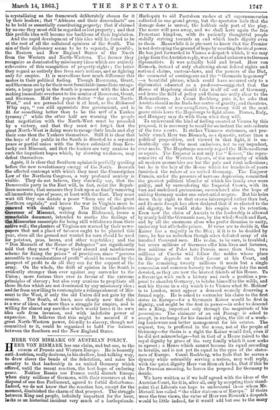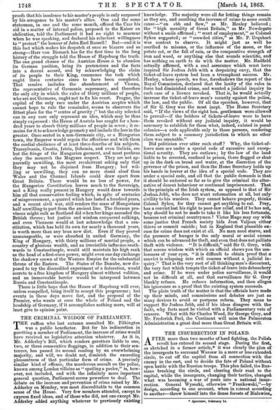HERR VON BISMARK ON AUSTRIAN POLICY.
HERR VON BISMARK has one claim, and but one, to the esteem of Prussia and Western Europe. He is honestly anti-Austrian, really desirous, in his shallow, loud-talking way, to draw closer the bonds of the federation, and raise his country to that leadership in an united Germany which offered, until the recent reaction, the best hope of enduring peace. Neither Russia nor France could disturb Europe when sixty millions of Germans, with their resources at the disposal of one free Parliament, agreed to forbid disturbance. Indeed, we do not know that the reaction has' except for the moment, diminished the charm of that prospect. The struggle between King and people, infinitely important for the hour, looks as an historical. incident very much of a harlequivade. Harlequin to aid Pantaloon. rushes at all supernumeraries collected in. one grand group, but the spectator feels that the damage done is unreal, the hubbub only part of the play. The scene will pass away, and we shall have again the free Protestant kingdom, with its patiently thoughtful people stolidly striving towards an end which lends dignity even to them. Meanwhile it is pleasant to know that the Premier is not destroying the ground of hope by courting the rival power. He has just forwarded to Vienna a despatch which, if we may judge from the Austrian reply, was of a kind unknown to German diplomatists. It was actually bold and broad. Herr von Bismark, instead of only chatterino-° about federal rights and national claims, customs-laws, and the powers of the Diet, the command of contingents and the "Germanic hegemony" —a beautiful phrase, which could have occurred only to a diplomatist educated as a professor—suggested that the House of Hapsbure. should take itself off out of Germany, and leave the field of policy and Germanic unity clear to the Hohenzollerns. As Count Rechbere-c' puts it, he asks that Austria should make Buda her centre of gravity, and threatens, in the event of non-compliance, Germany will at the next grave crisis leave the Hapsburgs to fight alone. France, Italy, and Hungary may do with them what they will.
To understand the kind of feeling created at Vienna by this proposal, it is necessary to recall for an instant the antecedents of the two conrts: It strikes Viennese statesmen, and pro- bably struck Herr von Bismark, as a dynastic, rather than a political proposition, and viewed in that light, it is un- doubtedly one of the most audacious, not to say impudent, ever made. The Hapsburgs scarcely regard the Hohenzollorns as equals. The Emperor is not only the "Kaiser," the repre- sentative of the Western Cmsars, of the monarchy of which all modern monarchies are but the pale and faint reflections ; but he is the heir of the House which for hundreds of years furnished the rulers of an united Germany. The Emperor Francis, under the pressure of nervous depression, committed the greatest political blunder of which his family ever were guilty, and by surrendering the Imperial. Crown with its vast and undefined pretensions, surrendered also the hope of uniting Germany under one substantial sceptre. But his heirs deem their right to that crown interrupted rather than lost, and Francis Joseph has often declared that if re-elected to the old dignity, he would stake his empire on its retention. Even now the claim of Austria to the leadership is allowed by nearly half the Germanic race, by the whole South and East, and by all the enormous class who prefer disunion to unity, under any but a Catholic prince. If votes are to decide it, the Kaiser has a majority in the Diet ; if it is to be decided by force, he has an unbroken though often defeated army of six hundred thousand men. His realm, to be sure, is troubled; but seven millions of Germans offer him lives and fortunes, five millions of Poles hate Prussia more than him, two millions of Czechs wiil follow the nobles whose place in Europe depends on their favour at his Court, and for the remaining twenty millions it needs but a single' concession and common honesty to change them into the most devoted, as they are now the bravest friends of his House. To a Sovereign with such a history and such a position a pro- posal to abandon Germany, to betake himself to the wilds, and seat his throne in a city which is to Vienna what St. Hellen' is to London, must appear a demand scarcely deserving a formal reply. He is asked to surrender his claim to the first status in Europe—for a Germanic Kaiser would be first in dignity, and might be the first in power—in order to descend into a King, important only through the magnitude of his possessions. The claimant of an old Peerage is asked to accept, in exchange for his fancied rights, the life of a work- ing landowner and better management for his estates. The request, too, is proffered in the name, not of the people of Germany—for theirs is a right the Kaiser would feel, even if he did not acknowledge—but in that of a House raised to the royal dignity by grace of the very family which it now seeks to uproot ; a House which cannot become its equal according to heralds, and is not yet its equal in the eyes of the states- men of Europe. Count Rechberg, who feels that he serves a dynasty while ostensibly serving a nation, may well reply, with the quiet dignity Herr von Bismark lacks, that if this be the Prussian meaning, he leaves the proposal for Germany to decide.
We have written as if we half agreed with the ideas of the Austrian Court, for it is, after all, only by accepting their stand- point that Liberals can hope to understand those whom Hr. Disraeli has called "the elder statesmen of Europe." If theirs were the true views, the value of Herr von Bismark's despatch would be little indeed, for it would add but one to the many proofs that his insolence to his master's people is only surpassed by his arrogance to his master's allies. One and the same statesman, in one and the same month, offered the Czar his aid in a matter of internal police, proposed to the Kaiser an abdication, told the Parliament it had no right to murmur when he was speaking, and declared his reluctant willingness to "protect" the honour of John Earl Russell ! But—and it is this fact which makes his despatch at once so bizarre and so strong—Herr von Bismark has for the first time in the long history of the struggle told the House of Hapsburg the truth. The one grand chance of the Austrian House is to abandon its German position, bring its pretensions and the facts into a decent accord, and by acknowledging the claim of its people to their King, commence the task which ought three centuries since to have been completed. That resolve includes the abandonment of Vienna, the representative of Germanic supremacy, and therefore the only city in which the ruler of thirty millions of people, who are not Germans, ought not to fix his court. Prague, the capital of the only race under the Austrian sceptre which cannot hope to rule the remainder, seems to observers the fittest place for the "centre of gravity ;" but the city selected can in any case only represent an idea, which may be thus simply expressed : the House of Austria has sought for a hun- dred years to absorb thirty millions of people in seven ; it re- mains for it to acknowledge geometi y and include the less in the greater. Once seated in a non-Germanic city, or a Hungarian town, the Emperor would regain the affections and with them the cordial obedience of at least three-fourths of his subjects. Transylvania, Croatia, Istria, Bohemia, and even Galicia, are but the fringe of the Hungarian garment, and must perforce obey the monarch the Magyars respect. They are not ap- parently unwilling, the most recalcitrant asking only that they may not be disjoined from Hungary ; but wil- ling or unwilling, they can no more stand aloof than Wales and the Channel Islands could draw apart from Great Britain. There would be no loss of power, for the Hungarian Constitution leaves much to the Sovereign, and a King really present in Hungary would draw towards him all that conservative feeling which, in spite of centuries of misgovernment, a quarrel which has lasted a hundred years, and a recent civil war, still renders the mass of Hungarians half unwilling to part from the ancient line. The German pro- vinces might sulk as Scotland did when her kings ascended the British throne; but justice and wisdom conquered sulkings, and even Viennese would at last acknowledge that a con- stitution, which has held its own for nearly a thousand years, is worth more than any bran new diet. Even if they proved unmanageable, or were absorbed in united Germany, the King of Hungary, with thirty millions of martial people, a country of glorious wealth, and an irresistible influence south- wards to Constantinople, would still maintain his high rank as the head of a first-class power, might even one day exchange the shadowy crown of the Western Empire for the substantial throne of the Eastern. The States of the Danube, now dis- posed to try the discredited experiment of a federation, would accrete to a free kingdom of Hungary almost without volition, and an immoveable barrier would be interposed between Russia and Constantinople.
There is little hope that the House of Hapsburg will ever, unless compelled, bring itself to accept this programme ; but events in these days move fast, and the proposal of the Premier, who wants at once the whole of Poland and the headship of Germany, if it accomplishes nothing more, will at least give to opinion point.































 Previous page
Previous page